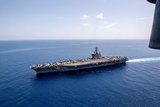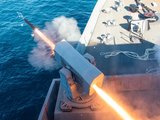Turkish partners unveil Ulaq ASW variant
Ares Shipyard and Meteksan have completed design and operational concept work on Ulaq ASW. (Photo: Ares/Meteksan)
Turkish defence companies Ares Shipyard and Meteksan unveiled the new anti-submarine warfare (ASW) member of the Ulaq unmanned surface vehicle (USV) family on 23 April, via a video published on Twitter.
Design and operational concept work on Ulaq ASW are complete, and production is scheduled to begin later this year, as the Turkish Navy seeks to enhance its anti-submarine capabilities.
Although officials from both companies did not make any statements about the new vessel, Ares and Meteksan are expected to deliver a detailed presentation during the IDEF ’21 trade show in Istanbul on 25-28 May.
Meteksan developed its Yakamos hull-mounted
Already have an account? Log in
Want to keep reading this article?
More from Naval Warfare
-
![RTX Raytheon targets nearly 170% RAM production increase to meet global demand]()
RTX Raytheon targets nearly 170% RAM production increase to meet global demand
The US multinational company is currently assembling 300 Rolling Airframe Missile rounds per year, with plans to reach 800 units annually after significant investment and modernisation of its facilities.
-
![Spain’s F100 upgrade mirrors Aegis modernisation paths in allied navies]()
Spain’s F100 upgrade mirrors Aegis modernisation paths in allied navies
The Spanish Navy’s Alvaro de Bazan-class of air defence frigates will receive the latest Aegis Weapon System technology among other modernisations to extend the service life to 2045.
-
![UK’s Fleet Solid Support ship programme deemed on track despite steel supply concerns]()
UK’s Fleet Solid Support ship programme deemed on track despite steel supply concerns
Shipbuilders are saying the programme is going ahead on time as the government estimates 7.7 million tonnes of steel are needed for 2026 infrastructure projects.
-
![Raytheon unveils details of its proposal for the US Navy/NATO ESSM Next Significant Variant]()
Raytheon unveils details of its proposal for the US Navy/NATO ESSM Next Significant Variant
In an exclusive interview with Shephard, Raytheon’s VP of Shipboard Missiles disclosed what improvements the company plans to offer for the Sea Sparrow NSV.






















